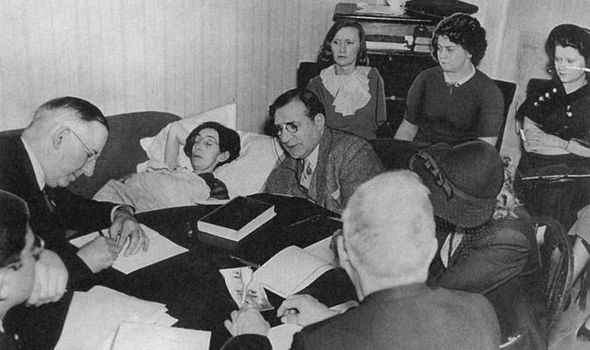
Grace Fryer before and after working at the US Radium Corporation. [Today in History, 2019]

Grace Fryer before and after working at the US Radium Corporation. [Today in History, 2019]
Grace Fryer filed a lawsuit along with four other women for damages of $250,000. In desperate need of money, they would eventually settle for $10,000 each and a $600 annual payment, although none of them would survive more than two years after the settlement.
A case filed by Catherine Donohue and her lawyer against the Radium Cooperation went to the Supreme Court on October 23, 1939. Donohue lost half her body weight, parts of her jaw fell out, and was nearly bedridden due to working with radium. She lost this case when the court decided not to hear the appeal and the lower ruling was sustained. She was awarded an annual pension of $277 for the rest of her life and was later additionally awarded $730. Prior to this, the Radium Corporation won eight court cases that accused them of hiding the dangers of radium, before being forced to pay a settlement.
After the company was forced to pay this settlement, workers were required to wear lead aprons, and workplaces would be required to close if there was any potential danger. In 1935 the American Medical Association ruled radium unfit for human consumption.
Eventually the rest of the girls spoke up. It took many years, since no lawyer wanted to work with them as it could ruin their business but eventually they came across one who would work with them. They found a lawyer named Raymond Barry, and he accepted graces court case, along with four others. Many women were on their deathbed so when the company decided to drag out the court case they were pretty angry. Many of the girls died from radium poisoning but if they didn't die from that they died from a cancerous bone tumor. Eventually as one of the girls was dying she found a lawyer and they fought for justice for all workers. That lawyer was Leonard Grossman, he was willing to work with them and after 8 appeals they finally won on October 23, 1939.

Catherine Donahue's bedside hearing. [Find a Grave, 2017]
"The case of the radium girls would also have an impact on establishing strict guidelines for worker safety and compensation beyond the Manhattan Project. In 1949, the United States Congress passed a law which gave workers the right to receive compensation for occupational illnesses."
"The thing that really got me was reading about the post-war studies of the dial painters. Scientists at Argonne National Laboratory in the Center for Human Radiobiology interviewed a lot of the former workers. There are some quotes from the 1970s, saying “I think the girls were making it up.” “Peg Looney, she was sick to begin with. She was never in the best of health.” That really shocked me. In the 1970s they're still denying what happened? The girls won their case in the 1930s. The quote was from a man who worked at the company with them, and he still believed in 1970s that they were lying about it. I think the community shunning them shows just how brave they were because they flew in the face of what everyone was telling them to do. They refused to stay silent."
~ Kate Moore